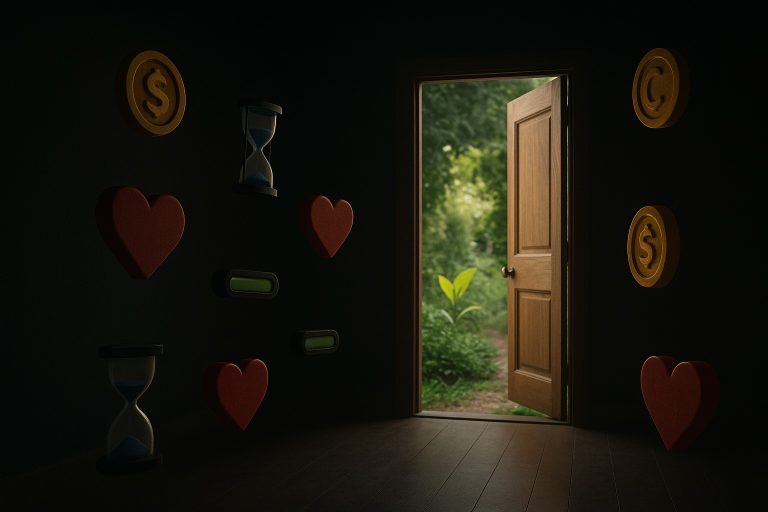We’re great at engagement. Maybe it’s time we aimed higher.
Games already have the attention of millions. But with that comes responsibility — and an opportunity to prepare players for the future, not just distract them from the present.
The games industry isn’t short on attention. We have people’s attention.
It’s short on purpose.
We’ve built entire business models around holding it — through storefronts, services, live ops, pipelines, engaging worlds and compelling launch beats. We’ve made careers out of nudging people back, keeping them “engaged.” The problem isn’t getting players to show up.
It’s deciding what we’re doing with them, now that they’re here.
We’ve mastered attention — in the same way behavioural design experts like Nir Eyal, author of Hooked have taught industries to engineer habit loops.
Jake, and the Limits of Focus


I’ve got a dog, whom I love. Jake. He’s an English Springer Spaniel — relentlessly energetic, annoyingly charming, and smarter than he lets on.
When I began training him, I was taught that the first thing a dog needs to learn isn’t a trick. It’s focus. Attention. You don’t teach “sit” or “stay” until the dog knows how to look at you and wait. You learn how to capture their focus.
Jake’s learned to tune in—most of the time. When he’s sitting still, panting, watching me, he’s not doing nothing. He’s poised. Listening. Ready.
I have his attention. But then there’s this long beat—longer with well-trained dogs—before the command comes.
I’ve trained him to wait. To push everything else out and just… wait.
Maybe I’ll throw a ball. He loves that. He’ll bring it back, tail wagging, eyes bright. And I’ll throw it again. And he’ll be entertained.
He’s a dog, not a citizen. He won’t vote, build, or shape the world. The future I’m preparing him for is simple. In his eyes, my job is just to show up. Preferably with cheese.
But generations of humans will shape the world. And they’re growing up with the games we make, offering us their attention. That carries weight.
Development at Scale — and a Crossroads
We don’t just make “games” anymore — we build platforms, pipelines, seasonal content strategies, content roadmaps, and user funnels.
We hire across design, engineering, art, narrative, analytics, marketing, monetisation, live operations, and more. And we do it brilliantly.
But the more infrastructure we build — the more powerful the machine becomes — the more important it is to stop and ask:
What are we building it for?
We’ve optimised for engagement. We’ve shipped on time (ish), pivoted when needed (ish), chased opportunity and margin and market. But how often do we stop and talk about outcomes?
Not outcomes for the company — outcomes for the people who play.
What We Could Do With This Much Talent
Games, as a medium, are already deeply capable. They can transfer knowledge, simulate systems, build fluency in skills that traditional education barely touches. But more than that — games are the only form of media that are practised, not just consumed.
And when you look at the full machinery of modern development — the craft, the planning, the raw talent — you realise just how much potential we’re sitting on.
We’ve built production cultures capable of delivering enormous, high-fidelity, global-scale experiences.
What if we turned that capability toward preparation?
Toward wisdom transfer?
Toward future fluency?
Yes, there are games out there trying to educate, to inspire, to train. But let’s be honest — most of what we call edutainment still feels like school in cosplay.
The potential of games goes far beyond that. We’re not here to decorate the curriculum. We’re here to reinvent how people learn, think, and prepare for a faster world.
Imagine a game that taught resilience through negotiation. Or financial systems through simulated scarcity. Not as a side mechanic — but as the point.
(For more on how games can teach complex systems thinking, see Donella Meadows’ Thinking in Systems.)
When Fun Was Enough — And When It Isn’t
I’ve been in games a long time. Long enough to remember when “fun” was the only design brief. And fair enough — we needed to explore the medium. There’s nothing wrong with joy.
But a lot of us have grown up. We’ve had kids. We’ve seen the complexity of the world, and we’ve started asking different questions.
What if the thing we shipped didn’t just entertain — but prepared people?
Not in a schoolbook sense, but in the sense of helping them see systems, try ideas, test cause and effect.
What if it gave them practice for being human?
The Future Will Belong to the Practised
The brightest minds of the next generation won’t have been shaped by textbooks and tests alone.
They’ll have learned by doing. By simulating. By navigating rich, complex, interactive environments. In other words — by playing. Not just by themselves, but alongside 10’s, 100’s, 1000’s of other players.
Not just by “learning games.”
By games.
Games move faster than schools.
Faster than policy.
Faster than most institutions built for the 20th century.
And that matters — because the problems coming at us now aren’t waiting for curriculum reviews or state interventions.
Climate. Misinformation. AI. Financial systems. Social complexity.
These are live challenges.
Games can be the sandbox where people prepare for them. Now.
The Center for Humane Technology and Games for Change are already highlighting the kinds of experiences that point in this direction — but we’ve only scratched the surface.
And we already know how to make those. We already have the teams, the talent, the pipelines.
What we choose to point them at — that’s the next big question.
Not a Lecture. A Reflection.
This isn’t a manifesto.
But if we already have people’s full attention — and the full might of our development capability behind us — then maybe it’s worth asking:
What are we here to build?
What matters?
Fun will always matter.
But purpose matters more now — because the stakes are higher.
We’re not just building entertainment anymore.
We’re shaping the scaffolding for future knowledge, resilience, and judgment.
We’ve already been doing it by accident.
Imagine what happens when we do it on purpose.
If you’re building games today, what are you building them for?
Further Reading
- Nir Eyal – nirandfar.com/hooked/: How habit-forming products engineer attention
- Donella Meadows – Thinking in Systems: The foundation of systems literacy
- Games for Change: A hub for socially impactful games
- The Center for Humane Technology: Rethinking design in the digital attention economy



